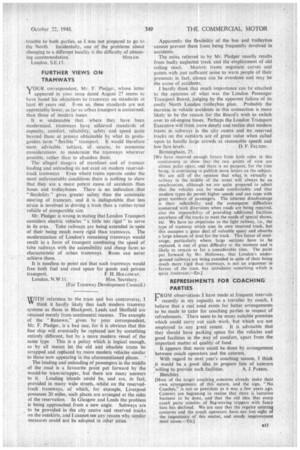WITH reference to the tram and bus controversy, I "
Page 47

If you've noticed an error in this article please click here to report it so we can fix it.
think it hardly likely that such modern tramway systems as those in Blackpool, Leeds and Sheffield are retained merely from sentimental reasons. The example of the "Renown," given by your correspondent, Mr. F. Pledger, is a bad one, for it is obvious that this fine ship will eventually be replaced not by something entirely different, but by a more modern vessel of the same type. This is a policy which is logical enough, so by all means let the old and obsolete trams be scrapped and replaced by more modern vehicles similar to those now appearing in the aforementioned places.
The loading and unloading of passengers in the middle of the road is a favourite point put forward by the would-be tram-scrapper, but there are many answers to it. Loading islands could be, and are, in fact, provided in many wide streets, whilst on the reservedtrack tramways, of which, for example, Liverpool possesses 20 miles, such places are arranged at the sides of the reservation. In Glasgow and Leeds the problem is being approached. from a new angle. Subways are to be provided in the city centre and reserved tracks on the outskirts, and I cannot see any reason why similar measures could not be adopted in other cities.
Apparently the flexibility of the bus and trolleybus 'cannot prevent them from being frequently involved in accidents.
The noise referred to by Mr. Pledger usually results from badly neglected track and the employment of ()Id rolling stock. Modern trains negotiate curves and
points with just sufficient noise to warn people of their presence; in fact, silence can be overdone and may be the Cause of accidents.
• I hardly think that much importance can be attached to the opinions of what was the London Passenger Transport Board, judging by the apparent failure of its costly North London trolleybus plan. Probably the increase in vehicle accidents in this connection is more likely to be the reason for the Board's wish to switch over to oil-engine buses. Perhaps the London Transport Executive will think more deeply and realize that modern trains in subways in the city centre and on reserved tracks on the outskirts are of great value when called upon to handle large crowds at reasonable speeds and low fare levels. D. F. FELTON.
Birmingham, 25. •
[We have received enough letters from both sides in this controversy to show that the two points of view are almost poles apart. and there is no purpose, for the time being, in continuing to publish more letters on the subject.
We are still of the opinion that what. is virtually a railway in the middle of the street will always be an anachronism, although we -are quite prepared to admit
that the vehicles can he made comfortable and that modern types do permit higher speeds and can cope with great numbers of passengers. The inherent disadvantage is their inflexibility and the consequent difficulties connected with diversions when roads are being repaired, also the impossibility of providing additional facilities anywhere off the tracks to meet the needs of special shows, etc. We have no objections to the light railway, i.e., the
type of tramway which uses its own reserved track, but this occupies a great deal of valuable space and absorbs a large amount of steel for the track. This factor of steel
usage,. particularly where large sections have to be • replaced, is one of great difficulty at the moment and is likely to remain so for a considerable time. The point
put forward by Mr. Holloway, that London's under, ground railways are being extended in spite of their being much more rigid than tramways, is not an argument in favour of the tram, but introduces something which is quite irrelevant.—ED.]




















































































